Preparing for a GDPR audit can raise concerns—do we know exactly where all personal data is processed? Is every action documented? Do we have up-to-date consents?
To reduce uncertainty, it’s essential to perform a full inventory of data and processing activities. This involves collecting information about all systems, processes, and assets related to personal data within the company. The result is a comprehensive data map—showing what happens, where, and for what purpose—which is crucial for demonstrating compliance with GDPR.
At the same time, organizations should verify formal aspects: the accuracy and completeness of documentation (e.g., policies, data processing agreements), the legal basis for processing, and the validity of obtained consents. Preparing for a personal data audit is not just a checklist exercise—it’s a key step toward full GDPR compliance and improved data security.
Key GDPR Responsibilities to Keep in Mind
Before an audit, it’s worth reviewing the main responsibilities of a data controller. These include:
- Identification of personal data – A detailed inventory of all systems, processes, and storage locations where personal data is held. This includes IT systems, databases, documents, and storage media containing employee or customer data. A comprehensive overview is the foundation for proving GDPR compliance.
- Data minimization and purpose limitation – According to Article 5 of the GDPR, personal data must be adequate, relevant, and limited to what is necessary for specific purposes. Organizations must collect only the data needed for clearly defined business goals and avoid using it for unrelated purposes.
- Data retention – The GDPR requires that data not be kept longer than necessary. The controller must define data retention periods and regularly review stored data. Once the processing purpose is fulfilled, the data should be deleted or anonymized without delay. These periods should also be recorded in the data processing register (Article 30).
- Right to be forgotten – Article 17 gives individuals the right to request deletion of their data. The controller must erase the data “without undue delay” when it’s no longer needed or when consent is withdrawn. Organizations must implement procedures to fulfill such requests, including removing data from all systems and notifying third parties if needed.
- Accountability and documentation – GDPR introduces the principle of accountability. Data controllers must demonstrate compliance with all data protection principles (lawfulness, fairness, transparency, etc.). This requires proper documentation: a processing register (Article 30), data protection policies, security procedures, incident records, and more. For example, Article 30 requires that categories of data, processing purposes, and planned deletion dates be properly documented. Good records make it easier to demonstrate compliance during audits.
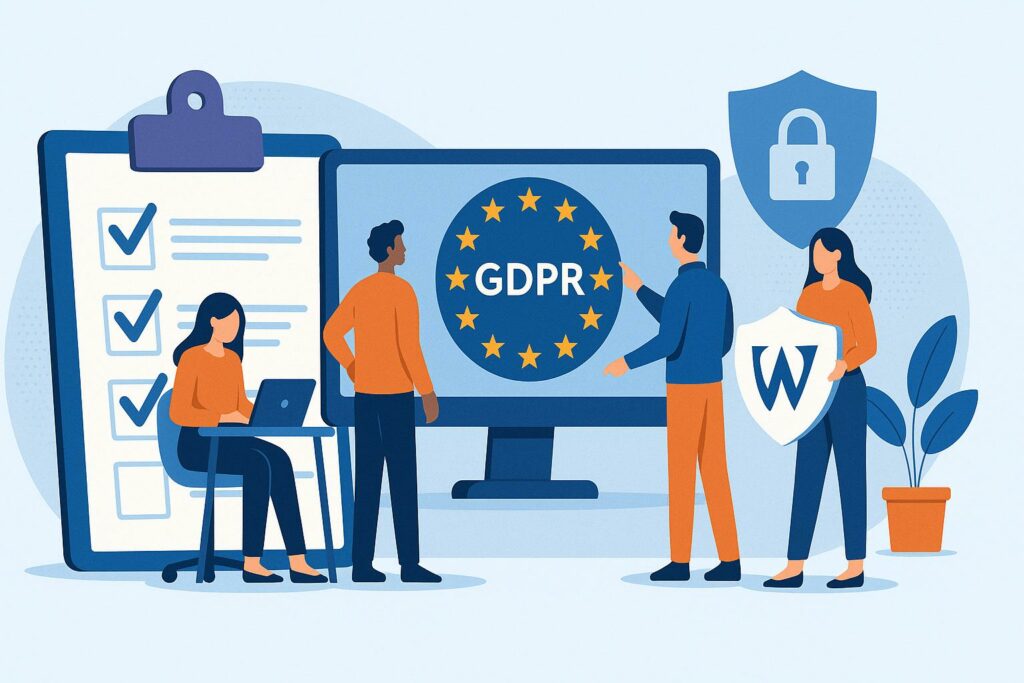
How Wizards Products Support GDPR Compliance
Preparing for a GDPR audit can be faster and more effective with the right tools. Wizards products address key data protection needs:
- Detecto – Scans systems and databases for personal data. Detects tables and fields with sensitive content and identifies changes in database structure. This helps with complete data asset inventories and supports anonymization and retention processes by keeping personal data under continuous review.
- Revelio – Searches for personal data in dispersed documents. It scans shared folders, employee devices, and email inboxes to locate documents containing sensitive data. This allows organizations to pinpoint where personal data resides—supporting audits and digitization efforts.
- Nocturno – An advanced anonymization tool for test and development environments. It uses an extensive set of dictionaries and generators to anonymize data across multiple systems while maintaining consistency and original data formats (e.g., date formats, checksums). It replaces personal data with realistic fictitious values without breaking testing workflows.
- Oblivio – A data retention and compliance management system. It acts as an internal platform covering all systems that process personal data. Oblivio monitors retention periods based on predefined rules and detects when the legal basis for processing expires. Once the retention period ends, it automatically launches anonymization workflows and generates audit-ready reports of data retention and deletion.
Checklist: Are You Ready for a GDPR Audit?
Before the audit, verify whether your company meets the key data protection requirements:
- Have you inventoried all personal data sets and processing activities in your organization?
- Do you maintain an up-to-date record of processing activities (ROPA) in accordance with Article 30?
- Are written policies, procedures, and data protection instructions in place and implemented (for processing, security, incident handling, etc.)?
- Are the legal bases for data processing (contracts, consents, authorizations, DPO decisions, risk assessments/DPIAs) current and documented?
- Have you defined retention periods for various categories of personal data and implemented mechanisms to delete or anonymize data once those periods expire?
- Have employees completed mandatory data protection training, and has a Data Protection Officer (DPO) or responsible person been appointed?
Regularly reviewing these points will help structure your audit preparation and reduce the risk of non-compliance.
Ensure GDPR Compliance with Wizards
Preparing for a GDPR audit is not something you should approach blindly. Rely on the expertise of our team and our modern compliance tools.
Book a meeting with the Wizards compliance team to discuss your organization’s needs. During the session, we’ll show how our products—Detecto, Revelio, Nocturno, and Oblivio—can streamline your data inventory, automate retention and anonymization processes, and help you prepare confidently for audits. Ensure full GDPR compliance and peace of mind—contact Wizards today.
Implementing DORA in a financial institution requires full compliance with the principles of digital operational resilience. The DORA regulation (2022/2554) obliges banks and their ICT service providers to continuously manage operational risk and cybersecurity. These requirements include the thorough identification and classification of all ICT assets, such as servers, applications, databases, and documents. Institutions must also document the relationships between these assets.
DORA mandates the implementation of IT incident handling procedures—from detection and analysis to system recovery. Any major cyber event must be reported according to official guidelines. Institutions are also required to regularly test system resilience, for example through penetration testing. Strict enforcement of data retention policies is equally crucial: data cannot be stored longer than legally permitted. Every change to the IT infrastructure must be logged and auditable.
Detecto – Data Identification and Risk Management
Detecto is a tool that automates the detection and classification of sensitive data in a company’s systems and documents. It uses AI technologies (OCR and NLP) to scan corporate resources (files, databases, emails) for personal and sensitive information. This makes it fully aligned with DORA’s requirement to identify all informational assets. Detecto enables organizations to:
- Detect all instances of personal data (e.g., national ID numbers, addresses, bank accounts) in documents and databases—reducing weeks of manual work to just a few hours of automated analysis.
- Generate reports that locate personal data assets—significantly simplifying internal and external audits (e.g., for DORA or GDPR compliance).
- Analyze incidents—if a data breach occurs, Detecto can quickly identify whether sensitive information was involved and what type of data was exposed.
By offering these capabilities, Detecto supports effective information risk management. It automatically builds a catalog of critical data and their storage points, helping institutions assess potential threats. This enables better planning of ICT risk mitigation activities and supports DORA’s requirements for protecting assets from unauthorized access or damage.
Revelio – Detection of Unauthorized Resources and Data
Revelio scans shared file storage, employee computers, and email accounts to identify documents containing sensitive data. It uncovers “hidden” resources—files and folders containing personal data that were not previously included in official systems. Revelio helps institutions to:
- Locate all documents with personal data (e.g., national IDs, medical or financial records) stored on company devices—providing visibility and enabling better protection.
- Identify business processes that generate sensitive documents—supporting the transition to digital workflows and reducing risks associated with paper-based or uncontrolled data sources.
- Support data retention policies—integrating with document deletion (anonymization) procedures once the retention period has expired. The system flags such files for archiving or deletion, helping to meet DORA and GDPR requirements.
- Build employee awareness—through oversight and reporting features that delegate data security responsibility across the organization.
Revelio enhances visibility across the data environment and identifies unauthorized information assets. In the DORA context, it ensures no confidential data is “forgotten” within the IT structure. Integrated with Oblivio, it supports full enforcement of data retention policies—once documents with expired legal grounds are detected, Revelio enables their safe removal or anonymization. This ensures compliance with DORA data protection and retention requirements.
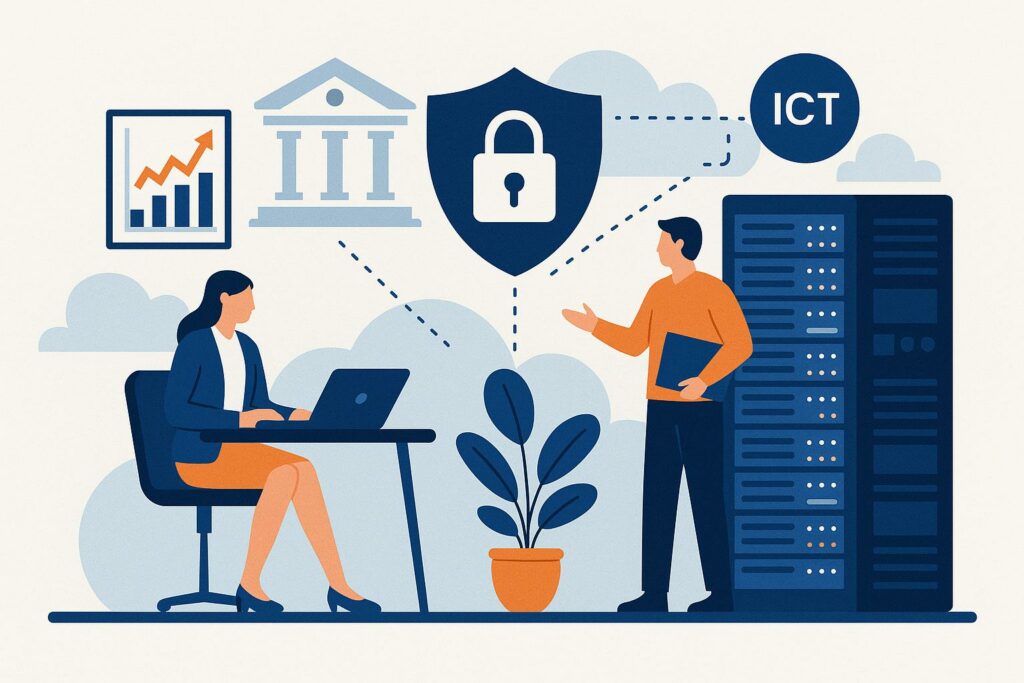
Nocturno – Safe Test Environments
Nocturno is a tool for creating secure test environments using anonymized production data. It allows financial institutions to test cyber resilience and business continuity without exposing real customer data. Nocturno uses custom dictionaries and generators to keep the structure of production data. It replaces real values like IDs, tax numbers, or birthdates with fictitious but valid ones. Key features include:
- Anonymization across multiple databases while maintaining consistency—Nocturno processes large datasets in parallel and ensures that identical records are anonymized the same way across all systems. This results in realistic test environments (e.g., the same user receives consistent fake data in all databases).
- Support for various database types (MySQL, Oracle, SQL Server, etc.) while respecting integrity constraints—Nocturno maintains checksums and table relations to avoid system failures.
- Integration with Detecto—first identifying sensitive fields, then automatically anonymizing them according to business rules.
These features minimize the risk of using real personal data during testing or system migrations. DORA requires resilience testing to occur in secure environments while maintaining data confidentiality. Nocturno enables this by supporting tests such as disaster recovery or simulated attacks without exposing sensitive customer data.
Oblivio – Managing the Data Lifecycle
Oblivio is a tool for central management of data retention and anonymization across the entire organization. It helps define how long personal data (e.g., consents or contracts) may be stored. After this period expires, Oblivio automatically cleans the database. It integrates with other IT systems and triggers data anonymization or deletion once the legal basis expires. Core functionalities include:
- Data retention configuration – setting rules for how long specific types of personal data can be stored. After this period, data is marked as expired.
- Anonymization and deletion – once retention conditions are met, the system replaces customer data with fictional values (e.g., a synthetic identity) across all related systems. This enforces the “right to be forgotten” and prevents unnecessary data retention.
- Reporting and audit – Oblivio provides detailed reports and statistics on deleted or anonymized records, enabling constant monitoring of the data retention policy.
- Accountability – every data operation (deletion, modification) is logged, including who performed the action and when. This gives financial institutions a complete audit trail for compliance reviews.
Oblivio helps meet DORA requirements for managing the data lifecycle and ensuring accountability. Automating retention processes reduces human error and ensures that no sensitive data is kept without a legal basis. The detailed logs prove that the institution’s data management policies are properly enforced—critical for audits and compliance checks.
Summary
Implementing DORA in a financial institution requires the synergy of modern data management and security tools.
- Detecto and Revelio automatically detect and classify data across systems and documents—supporting DORA’s inventory and asset protection requirements.
- Nocturno enables safe testing using anonymized data, ensuring confidentiality is maintained during resilience assessments.
- Oblivio manages the full data lifecycle—automating retention, deletion, and audit operations to ensure accountability and compliance.
By using Wizards tools together, financial institutions and ICT providers meet DORA’s technical requirements. At the same time, they strengthen operational resilience and are better prepared for cybersecurity incidents.
How can you break out of this dangerous pattern? The answer is vIn short, Oblivio acts like an intelligent data locator – scanning folders, databases, and cloud environments to identify what sensitive data is stored, where, and on what legal basis. Thanks to integration with Detecto, you can search for sensitive data across all company sources and systems.
As a central retention manager, Oblivio simplifies compliance with the right to erasure. It allows organizations to define clear data retention rules – specifying how long documents like contracts or employee records should be kept and assigning the legal grounds for doing so. Once the period ends, Oblivio automatically deletes or anonymizes the data in line with GDPR. Every action – scanning, anonymizing, deleting – is logged, giving IT and compliance teams full control and traceability.
How Does Oblivio Work?
Oblivio automatically scans files and IT resources for personal data. You can configure it to review selected locations such as network folders, file servers (including SharePoint), cloud libraries (OneDrive, Google Drive), relational databases, and email inboxes. It analyzes documents – even scanned ones – using OCR and advanced natural language processing algorithms, similar to the Detecto tool. This allows Oblivio to detect hidden patterns, such as a national ID or contact information stored in unexpected formats.
Oblivio typically operates in three stages. First, it identifies where personal data is stored and determines the legal basis for retention. Then, it maps relationships between data sources to ensure consistency. Finally, it applies retention rules – defining storage timeframes and legal grounds for processing. The system also answers questions from business owners, like “How long can we keep this data?” or “What’s the legal basis?” Rules are flexible and can be modified anytime to reflect real business processes.
As a result, companies gain full visibility into their data. Oblivio centralizes corporate data and automatically classifies documents by type (e.g., invoice, CV, contract, medical record), eliminating manual cleanup. Instead of browsing dozens of folders, an admin can generate a list of documents with personal data (like national ID, email, or phone number) in one click. The system also creates automated reports and shows where each type of data is stored.
Who Will Benefit?
Oblivio is useful for any organization processing personal data, especially in sectors with large data volumes and strict GDPR regulations. Example use cases:
- Finance and insurance: Banks, funds, and insurers handle hundreds of contracts and personal records daily. For them, centralized retention and structured data management are critical for GDPR compliance.
- Healthcare and medical sector: Clinics, hospitals, and pharmaceutical firms store highly sensitive patient data that must be protected and deleted once treatment ends.
- Public administration: Government offices, municipalities, schools – all manage systems registering citizen data (ID numbers, contact details, service history) and require centralized control over document retention.
- Corporations and mid-sized businesses: Companies with multiple departments (HR, IT, finance) and scattered data repositories. This is a classic “where is our data?” scenario – without Oblivio, enforcing a consistent retention policy is difficult.
No matter the industry, any organization prioritizing GDPR compliance and structured data management will benefit from Oblivio.

What Do You Gain by Implementing Oblivio?
Full data visibility: Automated reports show which systems and files contain personal data. You can track retention metrics in real time and easily locate every piece of information thanks to classification.
Order and GDPR compliance: A centralized retention management tool ensures the “right to be forgotten” is implemented consistently across all systems. When data deletion is due, it happens according to predefined rules.
Reduced risk of penalties: Oblivio automatically monitors retention deadlines and deletes outdated data – minimizing GDPR violations. With detailed logs, companies can prove compliance during audits.
Automation and time savings: From scanning to anonymization, all steps are automated. No more manually reviewing hundreds of documents. Saved time can be spent on more valuable tasks.
Accountability and auditability: Every action (deletion, data change) is logged, ensuring full accountability. Managers always know who did what and when – simplifying internal and external audits.
Example Use Case – Data Organization
Imagine a company with two systems: Sales System A and Marketing System B, both containing data about the same customers. When the processing agreement in System A expires. Oblivio detects the loss of legal grounds for retaining the data in both systems. After the configured retention period (e.g., 30 days), the anonymization process begins. The system prompts the system owner for confirmation. Once approved, the customer data in A and B is replaced with a dummy record. The result: personal data is permanently removed and replaced with pseudonymized entries in both applications – ensuring GDPR compliance. Without Oblivio (data organization), this process would require manual work from IT staff – taking days and risking human error.
Contact the Wizards Team
Oblivio puts you in control of your company’s data. It helps you manage scattered resources, reduce GDPR-related risks, and restore order in your IT environment. Ready to organize your business data?
Schedule a call with the Wizards team to see how Oblivio works and supports your business.
Nocturno is a specialized tool designed for 24/7 infrastructure monitoring system and after-hours service oversight. It was created to strengthen companies’ capabilities in identifying issues continuously – regardless of the time of day. Nocturno was designed to integrate easily with your existing IT stack. It connects to popular monitoring tools like Prometheus, Grafana, or Zabbix, and collects real-time data from log sources.
Nocturno offers flexible alerts tailored to emergency scenarios. Instead of relying solely on email, the system sends alerts via Slack, SMS, and webhooks to external tools like messaging apps or ticketing systems. This ensures that the right people are informed of incidents immediately – whether they are working or sleeping. Users can easily configure alert rules through an intuitive interface. It’s possible to set precise scenarios, such as deactivating resources at night or automatically escalating alerts to the next available person.
Nocturno is part of the Wizards product ecosystem. According to the documentation, it integrates with another tool – Detecto, which focuses on detecting sensitive data. This shows Nocturno’s flexibility and its ability to connect with various IT systems.
How It Works: Nocturno’s Key Features
Advanced metrics and log analysis: Nocturno collects real-time data from across the IT infrastructure (servers, databases, network services) and uses intelligent algorithms (including machine learning) to detect anomalies. It identifies unusual patterns early – such as a sudden spike in errors – without needing manual threshold adjustments.
Dynamic thresholds and trend detection: The system automatically adjusts boundary values to match natural fluctuations in load – avoiding false alarms during peak hours and detecting subtle issues when traffic is low. This results in fewer false positives and more effective observability outside business hours.
Flexible alert rules: Administrators can define multi-dimensional conditions that trigger notifications. For example: “If latency increases by more than 30% within 10 minutes and the number of error logs exceeds X, send an alert.” This allows combining various metrics and pinpointing critical issues more accurately.
Automatic escalations and duty schedules: Nocturno supports advanced response scenarios. If the first on-call person doesn’t respond, the system automatically forwards the alert to the next contact – like a team leader, operations board, or responsible engineer.This ensures continuous 24/7 response.
Integration with communication tools: Beyond Slack and SMS, Nocturno can send alerts to any service supporting webhooks (e.g., JIRA, Microsoft Teams, PagerDuty-type apps). This enables smooth collaboration with existing company processes.
Who Benefits the Most from Nocturno?
Nocturno is particularly useful for companies that operate 24/7 or serve clients outside regular hours. In practice, this solution will interest:
- Large organizations (50+ employees) with complex IT environments that can’t afford downtime – hiring additional night staff is costly and rarely justified.
- E-commerce companies offering 24/7 online services – any delay at night may mean lost orders and customers.
- Fintech and banking enterprises – the financial sector is increasingly global, and failure to monitor payment and online banking services around the clock affects reliability and customer trust.
- SaaS providers and tech firms – with high expectations for app availability, continuous service is key to user satisfaction.
All of these companies share a need for 24/7 infrastructure monitoring with near-instant incident response. For them, implementing Nocturno means significantly improving IT operations and peace of mind – knowing their monitoring system never sleeps.
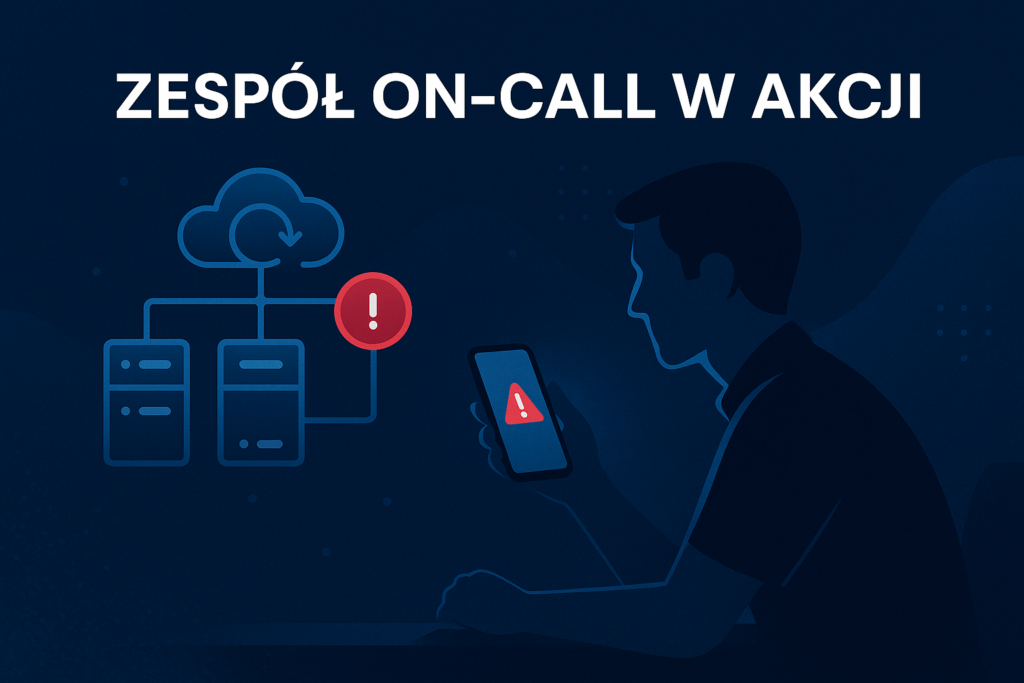
What Do You Gain by Implementing Nocturno?
Deploying Nocturno’s night monitoring brings tangible benefits to your business:
- Time savings: Automated alerts and analysis reduce the time needed to detect issues. Instead of manually reviewing logs, the system informs you of critical events automatically.
- Less stress for on-call teams: With fewer false alarms, engineers sleep better. They know they’ll only be alerted when action is truly needed – boosting morale and reducing burnout.
- Faster incident response: Automatic notifications (via Slack, SMS, etc.) reach the right people instantly – even before sunrise. This shortens the time from detection to resolution.
- Improved SLA metrics: Minimizing downtime helps the company meet or exceed service level agreements. Continuous monitoring and smart escalations reduce SLA violations, enhancing customer loyalty and avoiding penalties.
- Lower risk of customer churn: A night-time outage can hurt your reputation and lead to user attrition. With Nocturno, off-hour incidents are detected and addressed immediately – building trust and ensuring service continuity.
Example Scenario
Imagine your e-commerce company operates 24/7. If the payment module crashes at 3 a.m. and there’s no proper alerting tool, response might be delayed. The issue won’t be spotted until morning, and fixing it will take even longer. Meanwhile, customers try to pay in vain – hurting sales and your brand image.
Now imagine your company has implemented Nocturno. It immediately detects the failure – for example, a spike in payment transaction errors. The system sends a night alert to the on-call team via Slack and mobile phone. Within minutes, someone investigates the issue and disables the faulty service while activating a backup mode. The store continues operating with minimal interruption, avoiding major losses.
The difference is clear. Without Nocturno, your system runs blindly at night, and the on-call team carries the risk of downtime. With Nocturno, alerts reach the right people instantly. They can react quickly, while the system handles most of the work.
Summary and Call to Action
Nighttime system monitoring is now a necessity for companies that want to operate without interruptions. Nocturno by Wizards automates incident detection and response at any hour. This saves time, reduces stress, and ensures that your infrastructure runs smoothly – even while you sleep.
Want to protect your company from the effects of night-time outages?
Get in touch with the Wizards team and schedule a call. See how Nocturno (system monitoring) can support your services and improve infrastructure reliability – no matter the time of day.
In a world where data protection standards are becoming more stringent, and the number of documents is growing exponentially, companies face a major challenge: how to effectively locate and secure personal data across thousands of files, emails, and scans?
Imagine you’re the head of the compliance department. An audit is looming, and you must quickly find where sensitive personal information is hidden. HR, IT, finance departments send in hundreds of files. Stress levels rise. Time is running out. A single overlooked document — a contract with an ID number or a spreadsheet with employee data — could cost the company dearly.
In such situations, Detecto becomes a game-changer — a tool that automatically detects personal data across documents and databases, ensuring compliance with GDPR without wasting weeks on manual searches.
The Challenge: Too Much Data to Handle Manually
Today, personal data hides everywhere: in CVs, invoices, contracts, internal emails, and customer databases. Manually inspecting these resources is not only time-consuming but also highly error-prone. Meanwhile, regulations demand that organizations be able to respond promptly to audits and demonstrate control over the personal data they process.
Detecto leverages advanced artificial intelligence to automate this process. It combines OCR (Optical Character Recognition) and NLP (Natural Language Processing) technologies to search documents, even recognizing poorly formatted or hidden data. In short: it’s like a tireless assistant that never overlooks a detail and operates at speeds unattainable by human teams.
How Detecto Supports Your Business
Detecto brings real, measurable value across different departments:
- Compliance teams can generate reports on data locations, greatly simplifying audit preparation and minimizing regulatory risk.
- HR departments can quickly analyze recruitment documentation and employee records to ensure personal data is protected.
- Finance teams can automatically detect sensitive information hidden in contracts and invoices.
- IT teams can integrate Detecto with internal servers and data repositories, improving information security.
What once took weeks of tedious manual labor can now be completed within hours, thanks to Detecto’s automation.
Practical Use Cases
Imagine if your organization needed to prepare for a GDPR audit. By scanning document servers and selected databases, Detecto could immediately locate all files containing personal data: from identity numbers, names, and addresses to health data and signatures.
Or consider a company merging with another entity — Detecto would quickly map sensitive files that need anonymization before the transfer, preventing data breaches.
In case of a data leak or security incident, Detecto allows rapid analysis of compromised files to determine if personal data was exposed — essential for compliance with data breach notification requirements.
Why Detecto Is the Right Choice
Detecto stands out for several key reasons:
- Accuracy – advanced algorithms understand context and local formats, minimizing false positives.
- Speed – thousands of documents can be analyzed in a fraction of the time needed manually.
- Ease of integration – Detecto works with existing IT infrastructure, with APIs and connectors to popular data environments.
- Security – data is processed securely, ensuring compliance with GDPR requirements.
It’s a solution designed for the real-world challenges organizations face today.
Conclusion: Compliance Through Smart Automation
Automating the detection of personal data is no longer a luxury — it’s a necessity. In an era of ever-increasing regulatory pressure and growing volumes of documents, tools like Detecto help companies not only protect themselves against penalties but also build a culture of responsibility and transparency.
By choosing Detecto, businesses gain something invaluable: peace of mind, knowing that their data compliance processes are under control.
1. What is DORA?
DORA (Digital Operational Resilience Act) is an EU regulation aimed at strengthening the digital resilience of financial institutions. It imposes obligations related to ICT risk management, system resilience testing, and reporting of cyber incidents.
2. Who is affected by DORA regulations?
The regulation applies to a wide range of entities, including banks, investment firms, payment institutions, crypto-asset service providers, and external technology providers offering services to the financial sector.
3. When does DORA come into effect?
DORA came into force on January 16, 2023, but full compliance will be mandatory from January 17, 2025. Financial institutions have a two-year transition period to implement the required procedures.
4. What are the main requirements of the regulation?
Implementation of ICT risk management strategies.
Testing the digital resilience of IT systems.
Reporting cyber incidents.
Managing risks related to technology providers.
Sharing threat intelligence within the financial sector.
5. What penalties apply for non-compliance with DORA?
Failing to comply with DORA can result in high financial penalties, reaching several million euros. Companies also face increased risks of cyberattacks and loss of trust from clients and business partners. In extreme cases, regulators may impose operational restrictions or enforce additional supervisory measures.
6. How to prepare a company for DORA compliance?
Conduct an audit of IT security policies.
Implement cybersecurity testing and monitoring systems.
Train employees on the new regulations.
Develop ICT incident management plans.
7. What impact does DORA have on the financial sector?
DORA raises IT risk management standards and enforces a priority focus on cybersecurity. Financial institutions must adopt stricter system monitoring procedures and conduct regular cybersecurity resilience tests.
Mandatory penetration testing will help detect security vulnerabilities.
Faster incident reporting will improve transparency and accountability.
Stricter oversight of technology providers will require audits and security assessments.
As a result, DORA will enhance data security for customers and improve the sector’s resilience to cyber threats.
8. Does DORA affect cooperation with IT service providers?
Yes. Financial institutions must closely monitor technology providers, conduct audits, and enforce compliance with DORA regulations.
9. Key Steps to Implement DORA in a Company
Regulatory compliance analysis – Conduct an audit of IT systems and security policies.
Updating security procedures – Align ICT risk management standards with DORA requirements.
Implementing monitoring and testing tools – Ensure resilience against cyber threats.
Employee training – Raise awareness of the new regulations.
Developing incident reporting procedures – Enable effective threat response.
10. Challenges in Implementing DORA
Implementation costs – New standards may require significant investments.
Lack of ready-made solutions – Not all companies have adequate IT structures in place.
Integration with providers – Audits and system adaptations may affect business partnerships.
Organizational culture change – Effective implementation requires commitment from management and staff.
11. Why Take Action Now?
Although full DORA compliance will be mandatory from 2025, companies should start preparing as soon as possible.
Early implementation helps avoid penalties and strengthen cybersecurity.
Companies that have already adopted DORA gained greater operational stability and better reputations.
Advanced threat monitoring systems will allow faster response to attacks.
By implementing DORA now, organizations can avoid last-minute investments and better protect their systems from increasing cyber threats.
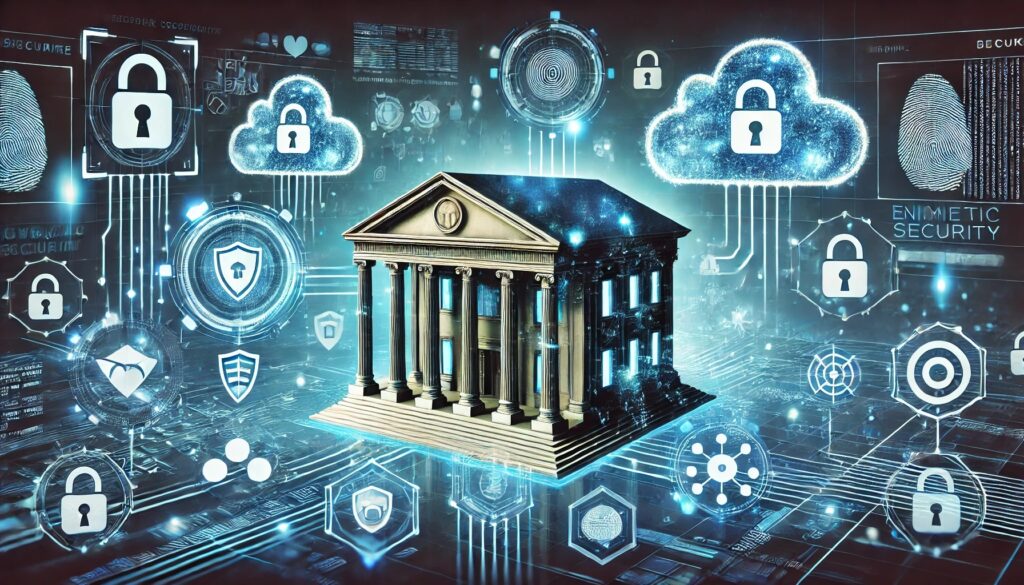
Updating your CV clause 2025 is crucial for legal and professional job applications. Under GDPR, recruiters can process your data only with explicit consent.
Why Is a GDPR Clause Important?
Your CV includes personal details like name, contact info, education, and work experience. Without a proper clause, recruiters cannot legally process your application.
Recommended GDPR Clause for 2025
If no specific wording is required, use:
“I consent to the processing of my personal data by [company name] for recruitment purposes.”
For extended compliance:
“I consent to the processing of my personal data as per the Personal Data Protection Act (Journal of Laws 2018, item 1000) and Regulation (EU) 2016/679 (GDPR).”
To allow future recruitment consideration:
“I consent to the processing of my data for future recruitment by [company name].”
How to Add the Clause to Your CV?
Place it at the bottom of your CV in a smaller font. Ensure the text is clear and specifies data processing purposes.
Final Recommendations
A GDPR-compliant CV clause is essential for a professional application. Regularly update it to match current legal standards and employer expectations. Proper placement and wording ensure compliance and enhance your credibility with recruiters. CV clause 2025.

The Digital Operational Resilience Act (DORA) is a European Union regulation that now applies to all financial institutions. Its primary goal is to enhance the financial sector’s resilience to digital threats. Cyberattacks have become one of the key challenges for the industry in recent years. DORA financial regulations – learn more.
The new regulations introduce unified ICT (Information and Communication Technology) risk management principles. Their purpose is to ensure financial market stability. Additionally, they enhance customer protection against cyber threats.
DORA not only imposes obligations on financial institutions but also changes the way they approach cybersecurity. The new rules require the implementation of comprehensive risk management systems and IT infrastructure resilience testing against various types of attacks. Institutions must take specific steps to comply with these regulations. Non-compliance may result in heavy financial penalties and a loss of trust from customers and business partners.
What Requirements Must Financial Institutions Meet?
DORA mandates financial institutions to implement new ICT risk management procedures to strengthen resilience against cyber threats. This includes internal organizational processes and oversight of external providers offering IT services to the financial sector. Companies must apply strict data protection mechanisms, ensure business continuity, and regularly test the resilience of their systems.
The new regulations emphasize cyber incident reporting and the implementation of preventive measures against future attacks.
Companies must develop strategies for responding to cyber threats. They should also implement communication procedures that enable rapid reporting of irregularities to regulatory authorities.
DORA also highlights managing ICT service providers. Financial institutions must carefully assess risks related to external IT systems and conduct compliance audits with the new regulations.
What Happens to Companies That Do Not Comply with DORA?
Non-compliance with DORA carries serious consequences. It can impact both financial stability and the reputation of financial institutions.
Financial penalties are just one part of the problem. An even greater threat is the increased vulnerability to cyberattacks. These attacks can result in customer data theft, operational paralysis, and even significant financial losses.
Failing to comply with DORA also weakens trust among customers and business partners. In today’s world, data security is a key factor in choosing financial services. Companies that fail to meet the new requirements risk losing competitiveness in the market.
Financial institutions must act quickly to comply with regulations. Only in this way can they avoid severe consequences of negligence.

How to Meet DORA Requirements?
Adapting to DORA requires a comprehensive approach and the involvement of the entire organization. The first step should be a detailed review of IT security policies and an assessment of the current resilience of systems to cyber threats. Companies should also audit their ICT service providers to ensure compliance with regulatory requirements and eliminate any potential security risks.
Cybersecurity testing is another key component of DORA compliance. Companies should regularly conduct penetration tests and vulnerability assessments to identify and eliminate weaknesses in their systems. Implementing new incident management procedures is essential to ensure a quick and effective response to potential threats.
Employee training is also crucial for DORA preparation. Cyber threat awareness and knowledge of incident response procedures must be at a high level for the entire organization to function in accordance with the new regulations. Companies should also invest in modern threat monitoring tools and automate security management processes. This will enable continuous risk analysis and minimize potential damages.
DORA – A New Reality for the Financial Sector
DORA financial regulations is changing how financial institutions manage their ICT systems. It places a strong focus on security, operational resilience, and digital risk management.
The new regulations are already in effect. Companies that have not yet adjusted should quickly implement the necessary procedures. Non-compliance increases the risk of cyberattacks and may also lead to legal and financial consequences.
The financial sector has no choice—it must adapt to these new realities. This requires a strategic and long-term approach to digital resilience.
DORA is not just an obligation. DORA financial regulations are also an opportunity to improve security and risk management. Companies should approach these changes with full commitment. By doing so, they will not only meet regulatory requirements but also build a stronger and more resilient organization prepared for future challenges.
The European Union has introduced an updated directive, NIS2, to address growing cyber threats. This regulation replaces the 2016 version and sets stricter security standards. It aims to protect networks and information systems in key economic sectors. NIS2 enhances security across the EU by introducing uniform requirements. It also expands protection to new areas of activity.
Objectives of the NIS2 Directive
The primary objective of NIS2 is to strengthen digital resilience by protecting strategic sectors such as energy, transport, healthcare, finance, and digital services. These measures are intended to ensure consistency of regulations across the European Union, eliminating legal gaps between member states. It is particularly important for entities responsible for critical services to effectively manage cybersecurity incidents and minimize their impact.
Key Changes Introduced by NIS2
The new regulations introduce several significant changes. First and foremost, the scope of sectors covered by the protection has been expanded, including postal services, waste management, and the chemical industry. Companies are categorized as either “essential” or “important,” allowing requirements to be tailored based on the significance of their operations. Stricter provisions also include increased financial penalties for non-compliance, reaching up to 10 million euros or 2% of a company’s global annual revenue.
Responsibilities of Businesses
For businesses, the NIS2 directive means implementing advanced risk management systems and conducting regular cybersecurity analyses. Companies will need to establish detailed procedures for reporting incidents to the appropriate authorities and ensure adequate employee training. While this may entail additional costs, it will build customer trust and minimize losses resulting from potential threats.
Impact on Consumers
Consumers are also affected by these changes, though less directly. The new regulations will improve the protection of personal and financial data. This will enhance security when using online services like internet banking and online shopping. Additionally, more stable and resilient information systems will lower the risk of disruptions. This applies to critical services such as healthcare and energy supplies.
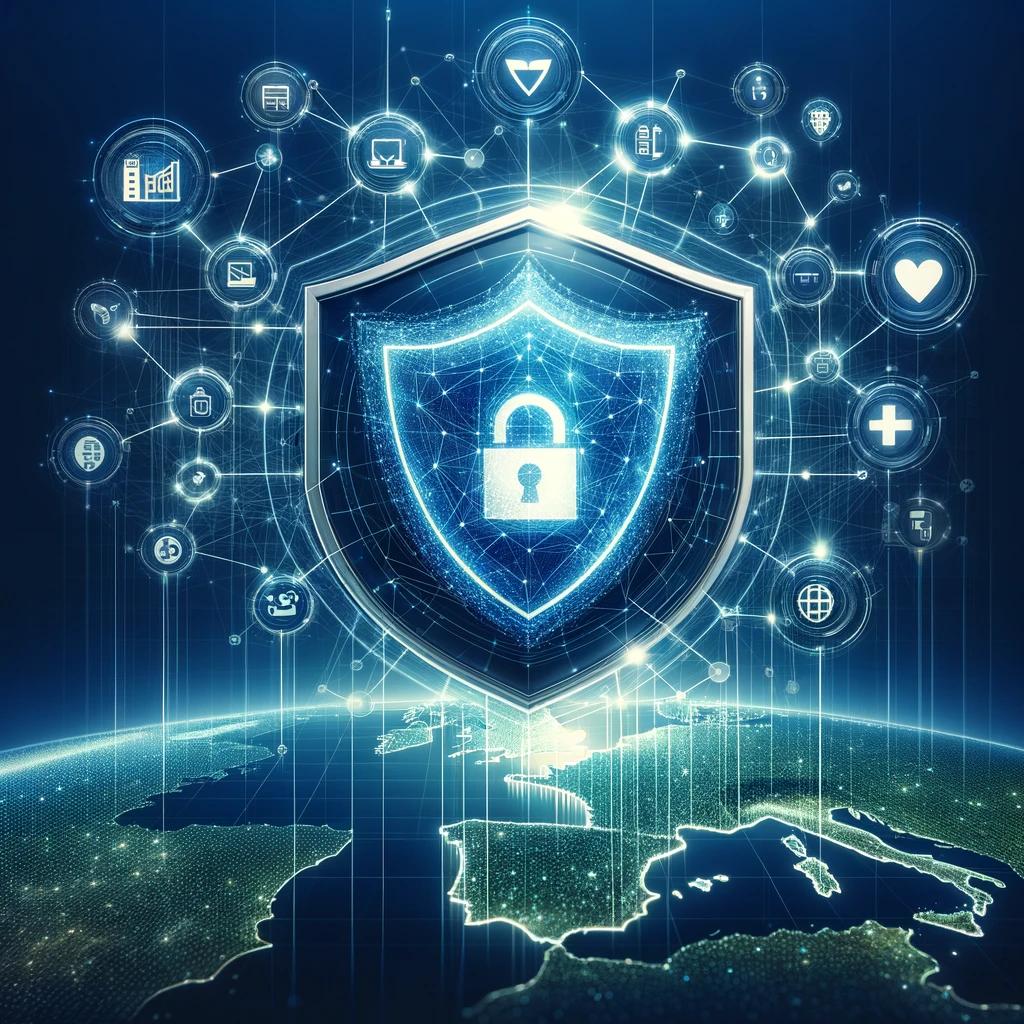
Implementation of NIS2 in Poland
In Poland, implementing the NIS2 directive requires amending the National Cybersecurity System Act, which must be completed by October 2024. The new regulations will strengthen the role of national supervisory authorities and impose additional obligations on entities responsible for critical infrastructure. In the long term, this will contribute to increased stability and security across the entire economy.
What Does NIS2 Mean for Businesses and Consumers?
The NIS2 directive is an important step towards better digital protection in Europe. Both businesses and consumers will benefit from more secure networks and systems, although implementing these requirements will demand engagement and investment. In the long-term perspective, the benefits of stability and personal data protection are invaluable.
Summary
NIS2 is the European Union’s response to rising cyber threats. It sets new security standards for key economic sectors. For businesses, this requires investment in advanced protection systems. These efforts will enhance customer trust and operational stability. Consumers will benefit from better data protection and improved digital service security. The directive’s implementation in Poland strengthens digital resilience across the EU.
On April 18, 2024, the Polish Government Legislation Center published a draft law. It implements the DORA in Poland regulation (Digital Operational Resilience Act) and Directive 2022/2556 into Polish law. This draft introduces amendments to several financial sector laws. The amendments align the domestic legal system with EU requirements for digital operational resilience.
DORA in Poland: Is the New Law Necessary?
The DORA regulation is directly applicable, meaning it does not require implementation into
Polish law. However, certain provisions, such as designating supervisory authorities or
establishing detailed rules for financial entities, necessitate adjustments to national
legislation.
For this reason, the Ministry of Finance proposed amending laws, such as the Banking Law,
the Payment Services Act, and the Financial Instruments Trading Act. These amendments
are primarily technical and aim to facilitate the implementation of the DORA regulation in
Poland.
Scope of Application
The DORA regulation allows for excluding certain entities, such as credit unions (SKOKs) or
Bank Gospodarstwa Krajowego, from its scope. However, Polish legislators decided to
include these institutions to ensure uniform application of the regulations across the financial
sector.
The draft law exempts key banking and financial sector entities from most provisions of the Polish Cybersecurity Act. However, these entities are not entirely exempt from domestic regulations. Their obligations are adjusted to meet DORA requirements.
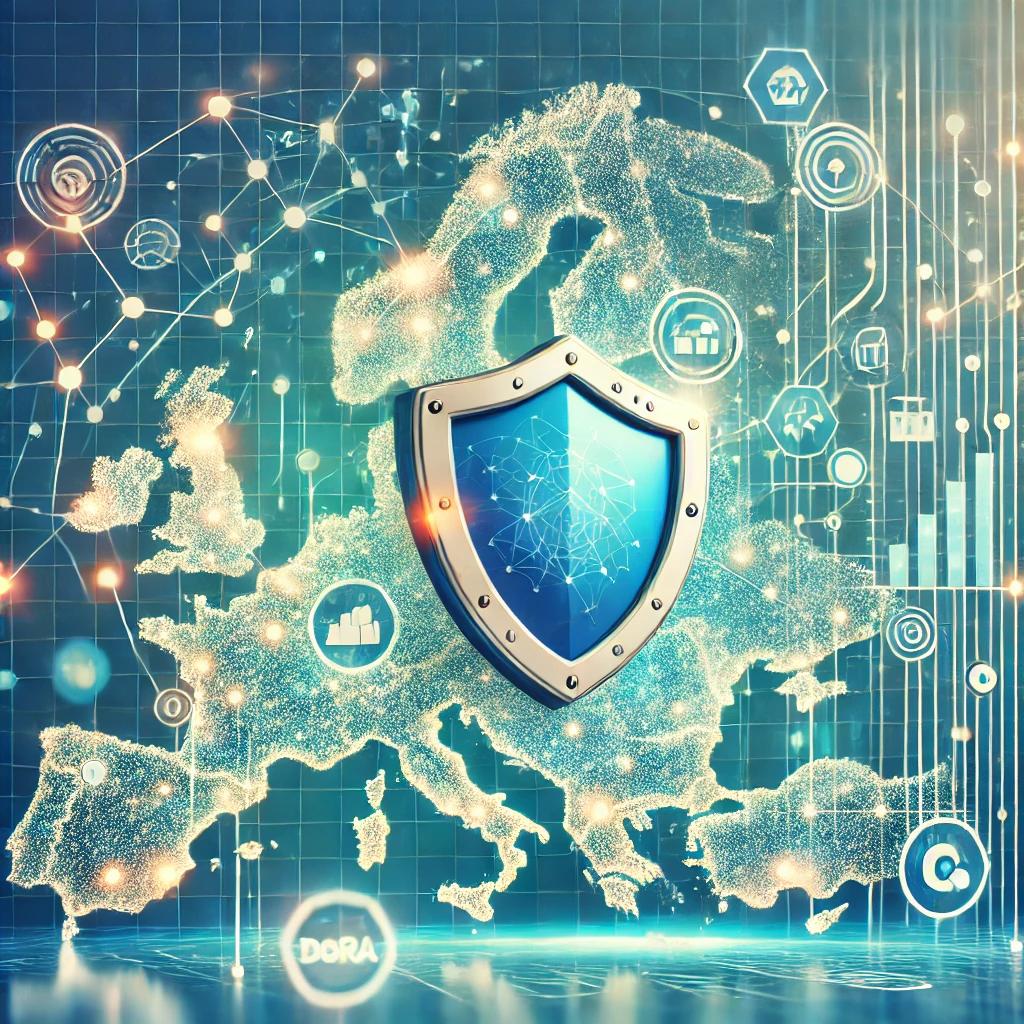
KNF as the Supervisory Authority
The draft law designates the Polish Financial Supervision Authority (KNF) as the body
responsible for overseeing compliance with DORA regulations. As part of its new powers,
the KNF will be able to:
● Supervise the activities of financial entities regarding digital resilience.
● Impose administrative penalties, including fines of up to PLN 20,869,500 or 10% of
annual revenue.
● Issue public statements identifying individuals or companies responsible for
violations.
● Temporarily suspend the use of services provided by key external ICT providers.
The KNF will also have the authority to request access to data transmission records and
require financial entities to report contractual arrangements related to ICT services.
Reporting of Contractual Arrangements
The draft law clarifies the reporting requirements for financial entities to the KNF, including:
● A 14-day deadline for notifying planned contractual arrangements regarding ICT
services for critical functions.
● Annual reports to be submitted by January 31 each year, starting in 2026.
Highlighting Innovation
The introduction of DORA regulations can also significantly contribute to the development of
technology in the financial sector. These regulations encourage the adoption of modern
solutions such as artificial intelligence (AI) and blockchain, which enhance digital security.
Implementing innovative technologies will enable financial institutions to better monitor risks,
streamline operations, and build customer trust. Integrating such tools can also support the
sector’s competitiveness on an international scale.
Entry into Force and Next Steps
The draft law will take effect on January 17, 2025. This date coincides with the start of the DORA regulation. Public consultation feedback is under review. The draft may undergo further modifications.
